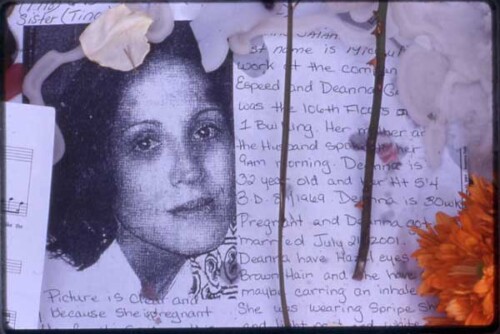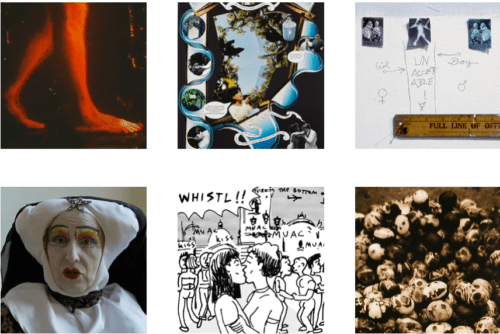Protective custody—also known as administrative segregation—is not necessarily safer, is much more restrictive, and often leads to the loss of privileges valued by inmates. The consistent use of isolation and solitary commencement—and the resulting devastating psychological impacts—have also been documented. Transgender prisoners are punished simply for being more at risk. 1
Lesbian women, or women who transgress gender boundaries, are also singled out for sexual abuse and mistreatment in the form of coercive repression and sexual violence. Prisons are gendered institutions of oppression, and lesbians are subject to significant dangers, both in the marginalization of them as women and as gender transgressors. Not Part of Her Sentence 2 details the pernicious presence of sexual abuse against incarcerated women. In this report, Amnesty International documents categories of women who were likely targets for sexual abuse. Perceived or actual sexual orientation is one of the four categories that make a female prisoner a more likely target for sexual abuse, as well as a target for retaliation when she reports that abuse. 3 The irony is that the lesbian prisoner—long stereotyped as a violent predator within the prison system—is at heightened risk of harassment and sexual abuse within its walls. 4
One such example of how sexual identity can subject a woman to further abuse or torture by prison guards is the case of Robin Lucas, who is African American. Prison guards taunted Ms. Lucas about her same-sex relationship by saying, “maybe we can change your mind.” She was originally incarcerated for credit card fraud and placed in a special Housing Unit of the Pleasanton Federal Detention Center in California. Despite complaining to authorities about harassment and threats around her sexual orientation and her placement in a unit generally housing men, her pleas went unheeded. Three inmates unlocked her cell, handcuffed, raped, and sodomized her, causing very severe injuries. Her attackers told her to keep her mouth shut and threatened her with further attacks if she alerted the authorities. The guards implicated in the abuse were simply transferred to another facility; no disciplinary action was taken. None of the guards or inmates was ever charged with a crime. A civil lawsuit was later settled in Robin Lucas’s favor. 5 Despite the furor raised over the grotesque violence suffered by Ms. Lucas and many others, the problem of gendered violence rages on in women’s prisons. Recently, ten women imprisoned in Michigan’s Scott Correctional Facility in suburban Detroit won a $15.4 million jury award in a sexual assault lawsuit for the rapes, sexual harassment, and verbal abuse they suffered at the hands of prison guards. 6
Finally, it is likely that queer defendants are subject to discrimination throughout their engagement with the judicial system, including vulnerability to harsher sentencing in criminal court. 7 Addressing systemic bias and hostility within the court system is of central importance to queer people. This bias, exhibited by key players in the legal system, such as attorneys, judges, court personnel, and juries, make the courthouse a hostile environment for many in queer communities. 8 This type of bias, however, has rarely been objectively studied or addressed. The limited research that has been conducted on anti-queer and anti-trans bias, however, has yielded some startling findings. 9
There have been at least two comprehensive statewide studies on the issue of bias against queer people within the legal system. One study conducted by the Judicial Council of California 10 found that thirty-eight percent of gay and lesbian respondents reported feeling threatened by the courtroom setting because of their sexual orientation or gender expression. The California study also found that one out of five court employees heard derogatory terms, ridicule, snickering, or jokes about gays or lesbians in open court, with the comments being made most frequently by judges, lawyers, or court employees. A second statewide study, conducted by the State Bar of Arizona, 11 found that seventy-seven percent of judges and attorneys reported that they heard disparaging comments about gays and lesbians. Forty-seven percent of those reporting hearing these disparaging comments also reported hearing them in open spaces of the courthouse. 12
- Bassichis, supra note 39, at 18-19.[↑]
- Amnesty International, Not Part of Her Sentence: Violation of the Human Rights of Women in Custody: Sexual Abuse and Women in Prison (1999), summary of report available at http://www.amnesty.org.[↑]
- Id.[↑]
- Estelle Friedman, “The Prison Lesbian: Race, Class, and the Construction of the Aggressive Female Homosexual, 1915-1965,” Feminist Studies Vol. 22 (1996) (detailing the historical emergence of the “predatory prison lesbian” stereotype).[↑]
- See Amnesty International, Crimes of Hate, Conspiracy of Silence (2001): 30 http://www.amnesty.org/en/library/asset/ACT40/016/2001/en/cd954618-d961-11dd-a057-592cb671dd8b/act400162001ar.pdf.[↑]
- Jeff Seidel, “Jury awarded $15.4 million to inmates,” Detroit Free Press, January 7, 2009 http://www.freep.com/article/20090107/NEWS06/901070395. A juror took the unusual step of making this statement: “We the members of the jury,” she began, “as representatives of the citizens of Michigan, would like to express our extreme regret and apologies for what you have been through.”[↑]
- Cf. William N. Eskridge, Jr., Gaylaw: Challenging the Apartheid of the Closet (1999): 88 (noting that poor and nonwhite gays have always fared worse than middle-class white gays in the criminal justice system).[↑]
- Michael Shortnacy, Sexual Minorities, Criminal Justice, and the Death Penalty, 32 FORDHAM URBAN L. J. 231 (2005) (noting instances of systematic bias against queers in the legal system).[↑]
- Id. at 232.[↑]
- Judicial Council of Cal. Sexual Orientation Fairness in the California Courts: Final Report of the Judicial Council’s Access and Fairness Advisory Committee (2001): 6-7 http://www.courtinfo.ca.gov/programs/access/documents/report.pdf [↑]
- State Bar of Ariz. Gay and Lesbian Task Force, Report to the Board of Governors (April 1999), summary of findings available at http://www.myazbar.org/Content/SecComm/Committees/SOGI/summary.html.[↑]
- Id.[↑]



